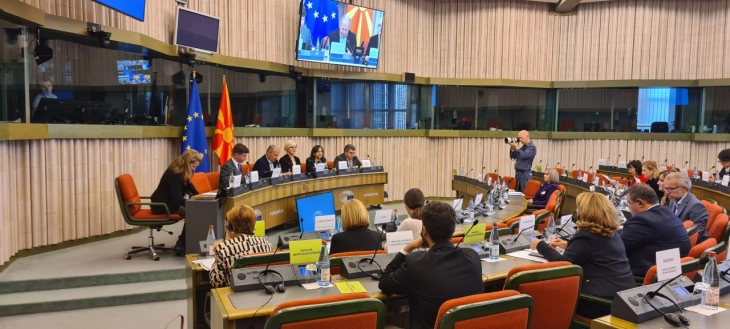North Macedonia-EU Joint Parliamentary Committee convenes in Strasbourg

Strasbourg, 5 October 2022 (MIA) – The 20th meeting of the North Macedonia-EU Joint Parliamentary Committee (IPC) began on Wednesday. MP Sonja Mirakovska heads the Macedonian delegation that also includes several lawmakers, MIA reports from Strasbourg.
Mirakovska expressed satisfaction from the fact that North Macedonia’s status has finally changed into a country that has launched the EU accession negotiations.
“As a result of the statehood decisions and steps undertaken by Macedonian institutions in recent months, the EU Council decided to adopt the Negotiating Framework on July 18, followed by the Intergovernmental Conferences with North Macedonia and Albania on the next day,” said Mirakovska.
She added that adoption of the negotiating framework traced the path for the start of the accession talks, which represents the final stage of the decades-long process.
“Many politicians, experts and citizens worked for this, many sacrifices, compromises and concessions have been made, lots of energy and efforts have been invested without thinking about our political careers and the consequences of these decisions. Nevertheless, one vision that unified us on this journey is the vision for a better life of our citizens and the second strategic objective that our citizens opted for since the country’s independence – full-fledged EU membership,” said Mirakovska.
Considering the reactions in the public over the content of the negotiating framework, the JPC co-chair said the Parliament has adopted conclusions that obligate the incumbent and future authorities to respect “our red lines over the course of the negotiations’ process.”
“This includes the Government abiding by the commitment for unconditional observance of the linguistic, identity, historic and cultural peculiarities of the Macedonian people as elements that are non-negotiable with the EU, as well as conducting the negotiations on an equal and principled basis while respecting the principles of international law. In addition, issues related to bilateral agreements that are not directly linked to the EU law and the Copenhagen criteria will not serve as benchmarks that determine the opening and closing of chapters and clusters during the accession negotiations,” said Mirakovska.
According to her, the accession talks are not a simple technical operation but a complex set of reforms, adaptation of the institutional infrastructure and enhanced activity of informing the public over the benefits of the reforms’ implementation.
Member of European Parliament (MEP) and JPC co-chair Andreas Schieder expressed assurance that “we are now in a special moment of EU-North Macedonia relations”.
“This meeting is taking place at an especially sensitive time, not only for North Macedonia but also for the EU, amid the explanatory screening,” said Schieder.
He said reforms are required that the Parliament should implement on the EU path, while recalling that the EP is against a parliamentary boycott.
“Boycott slows down good reform processes of the country and its achievements. Inter-party dialogue must find its place in order to achieve progress in the realization of North Macedonia’s strategic objectives, something that was highlighted in the EP resolution of May this year and the Jean Monnet Dialogue,” underlined MEP Schieder.
Functioning since 2004, the EU-North Macedonia Joint Parliamentary Committee is a forum where members of the Macedonian Parliament and the European Parliament share experiences, views and opinions on current issues and on ways to strengthen mutual partnership.







